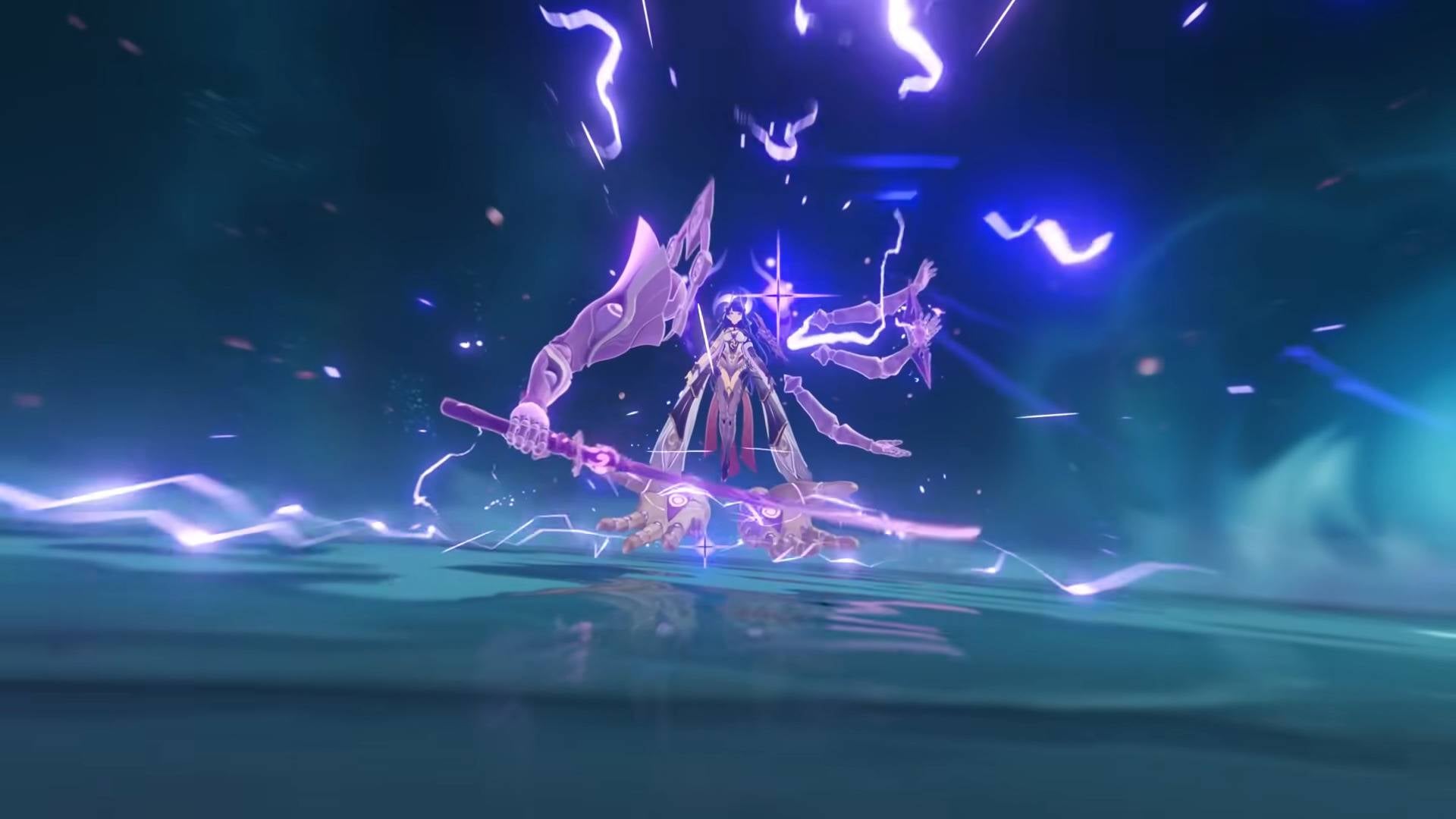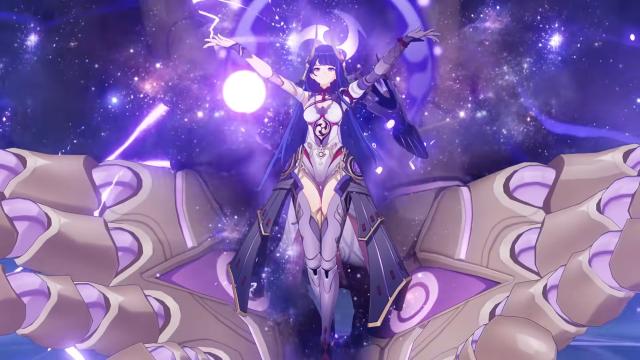When the main story of Genshin Impact’s Inazuma region concluded last September, a lot of fans (including yours truly) felt a little bit let down. The story felt incomplete, and the actions of its main villain, the goddess Raiden Ei, didn’t seem very logical. Later story updates helped to clarify the historical context, but the Inazuma chapter remained unsatisfying. With last week’s addition of Raiden Shogun’s latest character quest, however, the developers have proven that they had a plan all along, one that reveals profound depths of emotion in a character who previously felt underdeveloped. Now, we understand the irreplaceable loss this previously opaque antagonist endured, the unhealed wound she’s borne for centuries. The immortal goddess of Inazuma may be inherently fantastical, but her grief was something that I related on a crushingly personal level.
Prior to the update, the Inazuma storyline was about a tyrant–Raiden Shogun–who had stolen power from her citizens and closed off her country from the world. She centralised power and crushed her dissenters ruthlessly so that her country could remain unchanged. This tyrant, you eventually discover, was a clone of the real Raiden Ei, who had allowed her duplicate to rule in her stead. It fell to the main character to convince the goddess Ei to stop her tyrannical clone by proving that her people’s ambitions were worthwhile, rather than a threat to her ideal of “eternity.” Many players criticised the ending because the antagonist faced no consequences for her actions, and it felt hamfisted that she would change her political direction so quickly.
Many players also felt that the developers had “softened” Raiden Ei’s personality in order to appeal to a male playerbase. Gacha monetisation is heavily dependent on microtransaction sales from heterosexual men, after all, and fans were upset that a plot-important character might have had her personality blunted for the sake of her sex appeal.
However, that’s all changed with the 2.5 update. Players and critics alike are now praising her newly enriched characterization for its emotion and nuance. And with good reason. For starters, the storytelling itself is vibrant and effective, utilising the Sacred Sakura’s flower petals to great emotional effect, featuring exemplary voice performances for Raiden in both Chinese and English, and successfully integrating the history of Inazuma into the emotional beats. But most importantly, Raiden’s quest offers one of the most realistic portrayals of grief that I have seen in years.
When I finished the story last year, I had strong reservations about how Raiden Ei had inadvertently hurt so many people during the main questline. She was driven to such extreme actions because she had lost her sister 500 years ago to a catastrophic war, and she did not want to endure any more pain. Since change is an inevitable aspect of the everlasting march of time, I thought her excuse was incredibly flimsy. I also felt that Ei had not sufficiently atoned for her negligence. It turns out, the writers thought so too.
The latest update reframes the story from an ideological clash into a journey of processing personal trauma. Raiden Ei meets a number of ghosts who had died in her service. To honour their faith and regain the mantle of leadership, Ei must challenge her clone to a duel in her deceased sister’s subspace. Their battle goes on for ages. According to the tyrant, “The time our duels took to fight was long enough to witness the rise and fall of nations. The energy they consumed, great enough to vaporise the oceans and turn day into night.” This line is said in praise of Raiden Ei’s resolve, but duels aren’t fought alone. The conflict was also a testament to what Raiden Shogun represented: the tenacity of Ei’s old ideals, the accumulation of her grief. If the clone won, then Ei would be forced to follow her old ideals of keeping her country “eternal” and stagnant. If Ei won, then she would be able to choose a new future for herself and her nation.
In the real world, Japan was forced to end its isolationist policy after the United States had made a show of military force. In this fantasy timeline, Inazuma opens up its borders for a very different reason: its goddess gave herself permission to heal from an old emotional wound. There’s never an expiration date on grief, but the consequences of allowing it to fester are very real. Nobody could give the goddess permission to move on, except for another version of herself. It was not the protagonist or Ei’s head priestess who could give her that right. It was the clone that she had made for the purpose of keeping her shackled to her vow.
Although the Raiden Shogun serves as the antagonist here, her opposition is presented as principled and admirable. She represents Ei’s dedication to her deceased sister’s memory. She would fight her master in order to preserve the integrity of the goddess’ former vow. Her pledge is etched onto a rare gem that I’ve been collecting since the very beginning of the game: “This body is the noblest and most eminent of all in this world. It should hold absolute control over this world. It once promised its people a dream: the never-changing eternity.” I had previously thought that this was just some in-game historian’s flavour text about the goddess. Now I realised that these words were a serious vow that foreshadowed the present conflict. Once again, Genshin uses new content to redefine players’ old understanding of its fantasy world.

I was forced to fight the clone multiple times as a part of the quest, and her viciousness unsettled me. Because I knew exactly what she was trying to defend: her sense of who Ei was, and why she had allowed a 500-year-old loss to shape an entire nation’s foreign policy. When I was young, I formed my closest friendships online. It was the only way that I could be emotionally vulnerable with other queer people. When my friends and I inevitably drifted apart, I felt like a hole had been punched through my chest. Who was I without someone who could see me? Raiden Ei was her sister’s body double, her closest confidante, the only one who really saw her and knew her for who she was–they were so intertwined that many of her citizens never even knew that the country had two goddesses.
How do you replace someone who knows that you exist? You don’t. You calcify your memories of them and try to preserve your old feelings towards them until the end of time. For several years, I couldn’t watch Avengers movies because my ex loved them. They were her favourite characters, and I didn’t want to spoil our memories by imbuing them with new meaning. She made me into a better person, and it felt wrong to allow myself to move on from that. But I did move on, eventually, because I didn’t have a choice. Raiden Ei did have a choice. She could seal herself off into a timeless domain and ask a clone to rule a country in her place. And so she did.
A lot of this information was previously available through the game or official videos. But the incredible humanity of Ei’s internal struggle wasn’t apparent until the developers added the ferocious duel, and her touching reunion with her sister’s memory. These characters weren’t merely talking heads–the cinematographers effectively utilised moving cameras to build up energy and tension. The beautiful execution of these cutscenes demonstrates that there’s a difference between hearing about Ei’s backstory secondhand and experiencing it in real time.
Many fans thought that Raiden was just a moneymaker for miHoYo. I myself wasn’t cynical enough to dismiss her story outright, but I had my doubts. But now I find that hard to believe, since her quest had been handled with so much love. She’s the villain here, yes, but the storyline gives the goddess the opportunity to save herself from her own pain. And even after the goddess realises that she doesn’t need her old ideals, she chooses to accept her clone instead of discarding her. It’s a radical act of self-love, something I don’t often get to see in video games. I’m hoping that Genshin lets me see it more often in future story chapters.

Leave a Reply